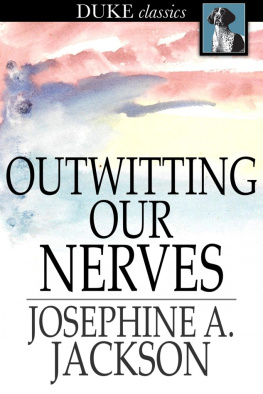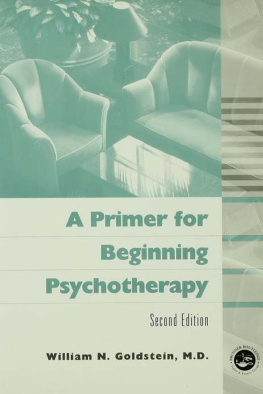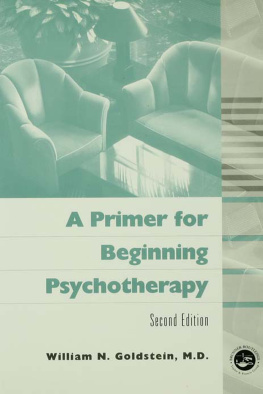OUTWITTING OUR NERVES
A PRIMER OF PSYCHOTHERAPY
* * *
JOSEPHINE A. JACKSON
HELEN M. SALISBURY
*
Outwitting Our Nerves
A Primer of Psychotherapy
First published in 1921
ISBN 978-1-63421-391-2
Duke Classics
2014 Duke Classics and its licensors. All rights reserved.
While every effort has been used to ensure the accuracy and reliability of the information contained in this edition, Duke Classics does not assume liability or responsibility for any errors or omissions in this book. Duke Classics does not accept responsibility for loss suffered as a result of reliance upon the accuracy or currency of information contained in this book.
Contents
*
*
To
MARY PATTERSON MANLY
A LOVER OF TRUTH
Foreword
*
"Your trouble is nervous. There is nothing we can cut out and there isnothing we can give medicine for." With these words a young collegestudent was dismissed from one of our great diagnostic clinics.
The physician was right. In a nervous disorder there is nothing to cutout and there is nothing to give medicine for. Nevertheless there issomething to be done,something which is as definite and scientificas a prescription or a surgical operation.
Psychotherapy, which is treatment by the mental measures ofpsycho-analysis and re-education, is an established procedure in thescientific world to-day. Nervous disorders are now curable, as hasbeen proved by the clinical results in scores of cases from civillife, under treatment by Freud, Janet, Prince, Sidis, DuBois, andothers; and in thousands of cases of war neuroses as reported by Smithand Pear, Eder, MacCurdy, and other military observers. These armyexperts have shown that shell-shock in war is the same as nervousnessin civil life and that both may be cured by psycho-analysis andre-education.
For more than a decade, in handling nervous cases, I have made use ofthe findings of recognized authorities on psychopathology. Truths havebeen applied in a special way, with the features of re-education soemphasized that my home has been called a psychologicalboarding-school. As the alumni have gone back to the game of lifewith no haunting memories of usual sanatorium methods, but with theequipment of a fuller self-knowledge and sense of power, they havesent back a call for some word that shall extend this helpful messageto a larger circle.
There has come, too, a demand for a book which shall give accurate andup-to-date information to those physicians who are eager for light onthe subject of nervous disorders, and especially for knowledge of thesignificant contributions of Sigmund Freud, but who are too busy todevote time to highly technical volumes outside their own specialties.
This need for a simple, comprehensive presentation of the Freudianprinciples I have attempted to meet in this primer of psychotherapy,providing enough of biological and psychological background to makethem intelligible, and enough application and illustration to makethem useful to the general practitioner or the average layman.
JOSEPHINE A. JACKSON.
Pasadena, California, 1921.
PART I - THE STRANGE WAYS OF NERVES
*
Chapter I - In Which Most of Us Plead Guilty to the Charge of "Nerves"
*
NERVOUS FOLK
WHO'S WHO
Whenever the subject of "nerves" is mentioned most people begin tryingto prove an alibi. The man who is nervous and knows that he isnervous, realizes that he needs help, but the man who has as yet feltno lack of stability in himself is quite likely to be impatient withthat whole class of people who are liable to nervous breakdown. It istherefore well to remind ourselves at once that the line between theso-called "normal" and the nervous is an exceedingly fine one."Nervous invalids and well people are indistinguishable both in theoryand in practice," The fact is that everybody is a possible neurotic.
So, as we think about nervous folk and begin to recognize our friendsand relatives in this class, it may be that some of us willunexpectedly find ourselves looking in the mirror. Some of ourlifelong habits may turn out to be nervous tricks. At any rate, itbehooves us to be careful about throwing stones, for most of us livein houses that are at least part glass.
THE EARMARKS
Am I "Like Folks"? Before we begin to talk about the real suffererfrom "nerves," the nervous invalid, let us look for some of theearmarks that are often found on the supposedly well person. All ofthese signs are deviations from the normal and are sure indications ofnervousness. The test question for each individual is this: "Am I'like folks'?" To be normal and to be well is to be "like folks." Canthe average man stand this or that? If he can, then you are not normalif you cannot. Do the people around you eat the thing that upsets you?If they do, ten chances to one your trouble is not a physicalidiosyncrasy, but a nervous habit. In bodily matters, at least, it isa good thing to be one of the crowd.
Many people who would resent being called anything but normalingeneralare not at all loth to be thought "different," when it comesto particulars. Are there not many of us who are at small pains tohide the fact that we "didn't sleep a wink last night," or that we"can't stand" a ticking clock or a crowing rooster? We sometimesconsider it a mark of distinction to have a delicate appetite and tohave to choose our food with care. If we are frank with ourselves,some of us will have to admit that our own ailments seem interesting,while the other person's ills are "merely nervous" or imaginary orabnormal. After all, a good many of us will have to plead guilty tothe charge of nervousness.
We have only to read the endless advertisements of cathartics and"internal baths," or to check up the quantity of laxatives sold at anydrug store, to realize the wide-spread bondage to that great bugabooconstipation. He who is constipated can hardly prove an alibi to"nerves." Then there are the school-teachers and others who are wornout at the end of each year's work, hardly able to hold on untilvacation; and the people who can't manage their tempers; and those whoare upset over trifles; and those who are dissatisfied with life. To acertain degree, at least, all of these are nervous persons. The listgrows.
Half-Power Engines. These people are all supposed to be well. Theykeep goingby fits and startsand as they are used to running onthree cylinders, with frequent stops for repairs, they accept thisrate of living as a matter of course, never realizing that they mightbe sixty horse-power engines, instead of their little thirty or forty.For this large and neglected class of people psychotherapy has astimulating message, and for them many of the following pages havebeen written.
The Real Sufferers. These so-called normal people are merely on thefringe of nervousness, on the border line between normality anddisease. Beyond them there exists a great company of those whose liveshave been literally wrecked by "nerves." Their work interrupted orgiven up for good, their minds harassed by doubts and fears, theirbodies incapacitated, they crowd the sanatoria and the health resortsin a vain search for health. From New England to Florida they seek,and on to Colorado and California, and perhaps to Hawaii and theOrient, thinking by rest and change to pull themselves together andbecome whole again. There are thousands of these peoplelawyers,preachers, teachers, mothers, social workers, business andprofessional folk of all sorts, the kind of persons the world needsmostlaid off for months or years of treatment, on account of somekind of nervous disorder.











